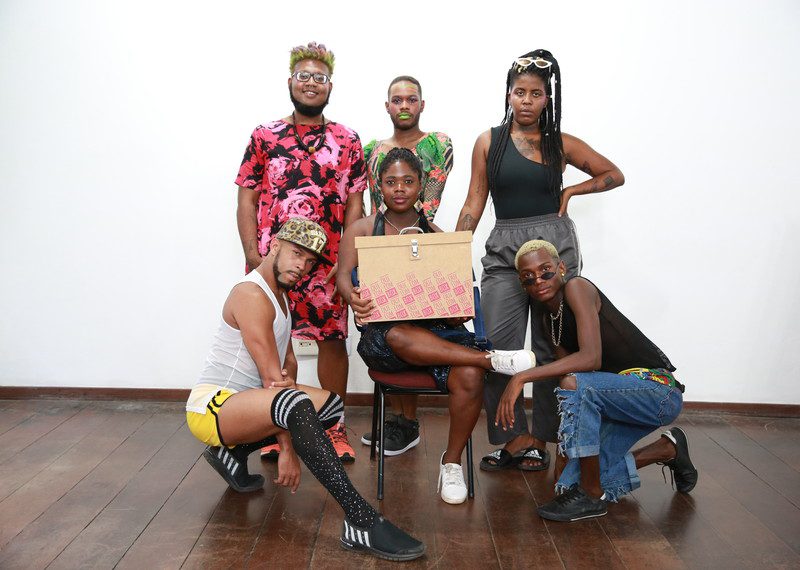Teacher, model and romantic, Alan Costa is a performance artist blazing a unique trail across Salvador, Brazil. Together with his collective Afrobapho, the 28-year-old human rights activist is using fashion, photography and art to spark conversations about what it means to be LGBTI and black in Brazil.
I’ve never been in love. I’ve never received love. In fact, I’ve never experienced a non-abusive relationship.
I used to believe in romantic relationships, but it just hasn’t happened for me. As a black, queer man, my body is seen as some kind of masculine ideal, yet there’s a distance around the way people think I can receive love and affection.
When I assumed my identity as black, queer and effeminate, I suddenly became a fetish. When I walked down the street, people wouldn’t talk to me, but in private, the same people who ignored me wanted a relationship where they could go wild and fulfil a fetish. I was an object for other people’s desires.
I used to go into these relationships because I was looking for love and affection. Instead, it led to loneliness and isolation.
I was inspired by the film Paris is Burning, where people created spaces to exchange love and affection.
That’s, in part, why I created the collective, Afrobapho. Born on the internet, Afrobapho is a space to discuss readings, books and articles exploring the intersection of race and gender.
It’s become my family and it gives me the affection I need. I am breaking through the barriers of society. I don’t need Prince Charming to find love. I’ve deconstructed this notion and I’ve found love in other ways.
Coming out
I realised I was different while I was at school. Kids would call me names such as “fag” or “little queer boy”. They were naïve. They’d learned this way of thinking from adults. Even though I had no idea about my sexuality, other people would point it out.
When I was 18, I moved to Salvador for university. I wrote a card to my mother explaining who I was and what it was like to grow up with this identity.
I wrote about the violence I suffered – all the different things people would call me and all the days I would come home from school crying. When she read the letter, she was surprised and scared, but supportive. To this day my mum is one of the most supportive people in my life and I can always count on her.
Defining moment
Being a black, gay man has defined my life. Brazil is a country rife with racism. It’s also home to the highest rate of LGBTI homicide in the world.
Given that black bodies experience the most violence, it’s impossible not to talk about intersectionality. Yet, in the LGBTI movement, there’s a reluctance to discuss how black bodies are hypersexualised and seen as objects.
Teacher, model and romantic, Alan Costa is a performance artist blazing a unique trail across Salvador, Brazil. Together with his collective Afrobapho, the 28-year-old human rights activist is using fashion, photography and art to spark conversations about what it means to be LGBTI and black in Brazil.
Afrobapho wants to challenge these perceptions. We want to make our presence seen and heard in a society we want to be part of. Salvador is a very heteronormative society, so wherever we are, we make people feel uncomfortable. People want us to stay in our ghettos, but we want them to discuss what this city is – a predominately black city, where the people living here hurt and reject us.
The older (advocacy) generation say talking about aesthetics is not enough, while black people are dying in the streets. However, I believe we’re complementing each other, as we’re increasing communication and discussion using a new technology.
Challenging perceptions
Afrobapho is making waves across Brazil. To date, our most successful campaign has been raising awareness about the killings of young black people in Brazil. We went to the military police headquarters, dressed in black and held up the names of the young people who had been murdered. We documented our work across social media… it was a way of using a new form to talk about an old issue. The campaign went viral and that’s how we started working with Amnesty International Brazil.
We teamed up with Amnesty International Brazil to develop the Quilombox – a box of educational materials that transforms into a projector – so we can educate people wherever we are. It provides an opportunity to discuss human rights through art, spoken word, dance and hip hop. It’s a really important tool for us and it’s helping us reach new people.
Teacher, model and romantic, Alan Costa is a performance artist blazing a unique trail across Salvador, Brazil. Together with his collective Afrobapho, the 28-year-old human rights activist is using fashion, photography and art to spark conversations about what it means to be LGBTI and black in Brazil.
Alongside Afrobapho, I also work in a school, where I use the Quilombox to discuss human rights issues. The kids love it. They like music and rap, because it plays into their own context. With the rap lab, they can put vocabulary to a beat, while talking about racism.
Our work is truly challenging perceptions. Yes, people can find our interventions violent, especially when we put on our leotards, make-up, hair and do the whole aesthetic performance, but we are just asking them to look at us for who we are. We don’t want to hide from anyone. We’re human and our bodies are real. We’re part of a longer history. We’re not just doing this for ourselves, we’re doing it for future generations.


